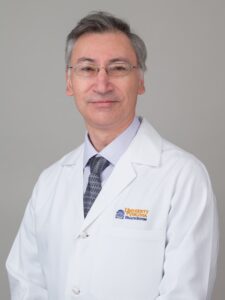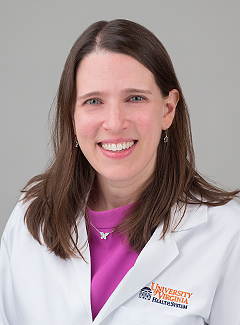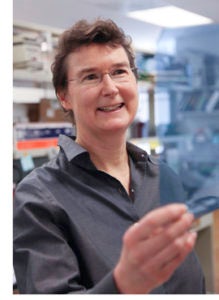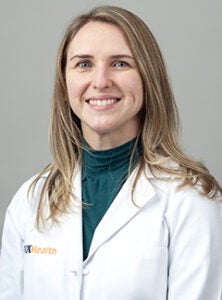Endocrine Investigators
About
Our clinical faculty members have a wide range of clinical and research interests, and the division has active research programs with state-of-the-art facilities. Please explore the links below to discover the research in some of our Endocrine labs.
Sue Brown, MD

Primary Appointment:
Professor of Medicine, Endocrinology, and Metabolism
Research Interests:
Treatment options for type 1 diabetes with a focus on automated insulin delivery systems.
Christine M Burt Solorzano, MD
 PRIMARY APPOINTMENT:
PRIMARY APPOINTMENT:
Professor of Medicine, Endocrinology, and Metabolism
Research Interests:
Dr. Burt Solorzano is a clinical investigator studying early etiologies of polycystic ovary syndrome in girls and is involved in multi-center studies for type 1 and 2 diabetes in children. She is the medical director of the UVA Children’s Fitness Clinic. She created the UVA Go Girls! fitness support group, which uses dance to promote physical activity and healthy living in youth.
Silas Culver, MD
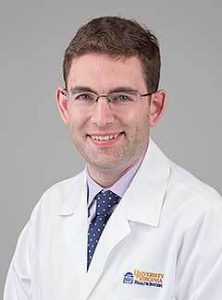
Primary Appointment:
Assistant Professor of Medicine, Endocrinology, and Metabolism
Research Interests:
- The role of ATP6AP2 in renal lipotoxicity (fatty kidney) in the setting of metabolic syndrome, including fatty acid uptake and lipid metabolism.
- The function of ATP6AP2 in proximal tubule transport of metabolites.
- The regulation of renal sodium retention and its effects on blood pressure during obesity.
- The role of ATP6AP2 in adipose tissue lipid accumulation and metabolic dysfunction.
Leon S. Farhi, PhD
Primary Appointment:
Associate Professor of Research, Medicine: Endocrinology and Metabolism
Research Interests:
Understanding the mechanisms that regulate glucagon secretion, glucose homeostasis, and growth hormone release. Mathematical modeling of hormone networks. Diabetes, hypoglycemia, artificial pancreas technology.
Heather Ferris, MD, PhD
Primary Appointment:
Assistant Professor of Medicine, Department of Medicine
Assistant Professor, Department of Neuroscience
Research Interests:
Type 2 diabetes, midlife obesity, and midlife hyperlipidemia are risk factors for cognitive decline and Alzheimer’s. Our research uses cell and animal models to study the impact of metabolism on the brain. In particular, we are interested in:
- The role of cholesterol as a signaling molecule in the brain in diabetes and Alzheimer’s disease.
- Understanding the role of insulin in the pathogenesis of Alzheimer’s disease.
- Control of brain cholesterol synthesis and transport as a potential therapeutic approach for Alzheimer’s disease.
- Understanding the role of insulin and IGF1 in the pathogenesis of Alzheimer’s disease.
Daniel J. Haisenleder, PhD
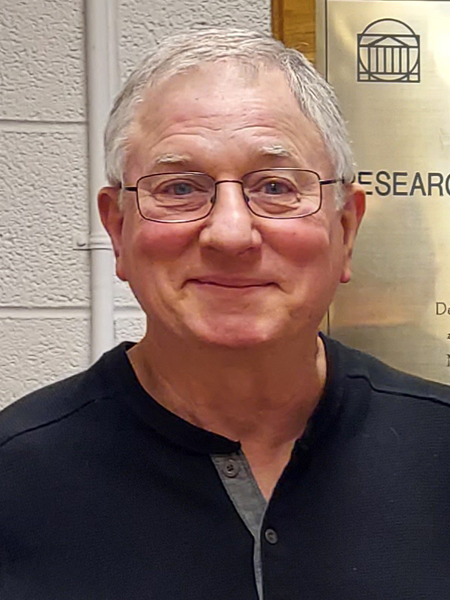
Primary Appointment:
Associate Professor of Research, Medicine: Cardiovascular Medicine
Research Interests:
Reproductive and related endocrine testing for clinical and basic research projects.
Immunoassay development and characterization.
Thurl Harris, PhD
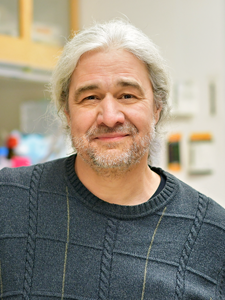
Primary Appointment:
Associate Professor and Director of Graduate Studies, Pharmacology
Research Interests:
Molecular mechanisms controlling insulin signaling and fat synthesis.
William B. Horton, MD, MSc, FACP

Primary Appointment:
Assistant Professor of Medicine, Endocrinology, and Metabolism
Research Interests:
Epidemiological data indicate that people with type 1 diabetes (T1D) have 8-13 years shorter lifespans than the general population. Similarly, people with T1D have a substantial excess rate of cardiovascular events that occur more than a decade earlier than in the general population. Years of high and variable glucose levels accelerate the journey towards cardiovascular disease (CVD) in T1D. Despite this increased cardiovascular risk, the pathophysiology driving the relationship between CVD and T1D is poorly understood. While interventions that improve mean glycemic, blood pressure, and lipid control have reduced rates of vascular complications, the difference in CVD risk between persons with T1D and the general population endures, unexplained by conventional risk factors. These data suggest that factors independent of hemoglobin A1c normalization drive T1D CVD outcomes. One potential explanation for this is glycemic variability. People with type 1 diabetes experience frequent and wide glycemic excursions (including both hypo- and hyperglycemic excursions) on a near daily basis. Emerging evidence has found that glycemic variability predicts cardiovascular events and mortality in multiple patient populations. We are interested in defining the pathophysiologic mechanisms whereby glycemic variability contributes to CVD in T1D. We are also interested in determining whether therapies that reduce glycemic variability in T1D (i.e., closed-loop artificial pancreas systems) improve cardiovascular health.
Susanna Keller, MD
Primary Appointment:
- Associate Professor of Medicine, Endocrinology, and Metabolism (primary)
- Associate Professor of Cell Biology (secondary)
- Director, UVA Diabetes Center Animal and Cell Characterization Core
Research Interests:
- Insulin signaling
- Insulin-regulated membrane trafficking and associated changes in cellular function and whole body physiology
Zhenqi Liu, MD
Primary Appointment:
- James M. Moss Professor of Diabetes
- Professor of Medicine
- Past Chief (2012 – 2021), Division of Endocrinology and Metabolism
Research Interests:
My laboratory has long been interested in insulin action in health and diabetes. Currently, the primary focus is on regulating insulin action in the vasculature and its relation to insulin’s metabolic action and the cardiovascular complications of diabetes. We use a variety of rodent models and cultured cells to study the mechanisms of insulin action and conduct clinical research studies in humans with or without diabetes to see how insulin’s vascular actions are regulated in humans with or without insulin resistance and diabetes.
Kaitlin Love, MD
Primary Appointment:
Medicine: Endocrinology and Metabolism
Research Interests:
Vascular dysfunction and insulin resistance in type 1 diabetes
Helmy M. Siragy, MD, FACP, FAHA
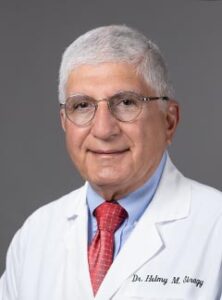
Primary Appointment:
Professor of Medicine and Endocrinology
Research Interests:
Dr. Helmy M. Siragy developed the microdialysis technique, which led to a Golden Age of revolutionary discoveries about the nature of angiotensin receptors and renal paracrine hormones.
The lab focuses on the biology and pathophysiology of angiotensin subtype receptors in the cardiovascular system. Currently, the lab is conducting pioneering translational research that has a major clinical impact and is related to cardiac ischemia, diabetic kidney disease, local tissue production of aldosterone, and its paracrine functions in the kidney and heart.

